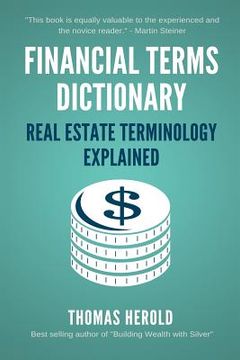Share
Financial Terms Dictionary - Real Estate Terminology Explained
Thomas Herold
(Author)
·
Wesley Crowder
(Author)
·
Independently Published
· Paperback
Financial Terms Dictionary - Real Estate Terminology Explained - Crowder, Wesley ; Herold, Thomas
Choose the list to add your product or create one New List
✓ Product added successfully to the Wishlist.
Go to My Wishlists
Origin: U.S.A.
(Import costs included in the price)
It will be shipped from our warehouse between
Thursday, July 04 and
Tuesday, July 16.
You will receive it anywhere in United Kingdom between 1 and 3 business days after shipment.
Synopsis "Financial Terms Dictionary - Real Estate Terminology Explained"
Make Better Financial Decisions - Understand Real Estate Terms This practical financial dictionary for Real Estate terms helps you understand and comprehend most common Real Estate lingo. It was written with an emphasis to quickly grasp the context without using jargon. Each of the 120 Real Estate terms is explained in detail and also gives practical examples. It is based on common usage as practiced by financial professionals. Compiled over the last 3 years from questions and feedback to financial articles published by the Wealth Building Course education program. What Every Real Estate Investor Needs to Know This book is useful if you are new to business and finance. It includes most real estate terms for businesses, investors and entrepreneurs. It also covers the lingo that was introduced in the financial crisis of 2008 until 2017. With the alphabetical order it makes it quick and easy to find what you are looking for. Financial Dictionary Series Additional financial dictionaries are available in this series. Please also check out: Banking, Retirement, Corporate Finance, Economics, Investments, Acronyms, Laws & Regulations, Accounting & Trading. Click on the author name to see them. Example: What is a Chain of Title? A chain of title refers to the consecutive historical transfers in a title on a particular piece of real estate property. These chains start with the current owner of the property and trace their way back to the property's first owner. Reconstructing such a chain can be extremely important when a lender needs complete ownership documentation. Such title documents are generally kept by registry offices with local and municipal governments. The field of real estate places tremendous importance on such a chain of title. Because it can be difficult to construct them, companies have come up with systems to track ownership and registration of real estate property. One of these is the Torrens Title system. Insurance companies in the United States will provide title insurance on a property. They do this using the chain of title on real estate that the owners are transferring. These chains are so important that many title insurance companies will keep their own private title operations to track such titles so they do not have to rely on only official government records. In cases where it is difficult to come up with a complete chain, abstracts of title can be utilized. Attorneys will sometimes certify these. Lack of a clear chain of title has caused significant problems during the Great Recession of 2008. These problems began when many lending companies made the choice in 1995 to use an electronic registry to hold the title. The best known company in this arena was MERS Mortgage Electronic Registration Systems. The banks tried to use this system so they could sell and purchase mortgages without needing to register ownership changes with the appropriate local governments. Without clear title chains, the banks were often not able to come up with the original titles needed to force foreclosures and evictions as individuals defaulted on their mortgages. A number of states throughout the U.S. sued the banks over these actions. The chain of title is also utilized in intellectual property areas. With the film industry, they refer to documentation that demonstrates the ownership rights of a particular movie. These chains can be used in other creative endeavors in the movie business. If many individuals contributed to the creative work, authorship is owned by a large number of the writers. Note: This example description is shorted due to publish restrictions. Each term is explained with 600 words and more.
- 0% (0)
- 0% (0)
- 0% (0)
- 0% (0)
- 0% (0)
All books in our catalog are Original.
The book is written in English.
The binding of this edition is Paperback.
✓ Producto agregado correctamente al carro, Ir a Pagar.

